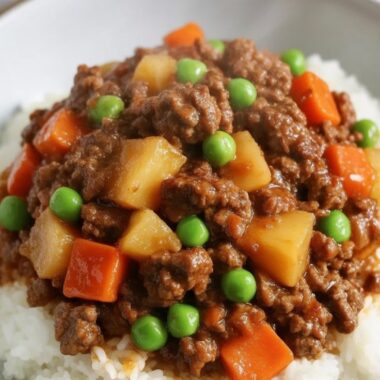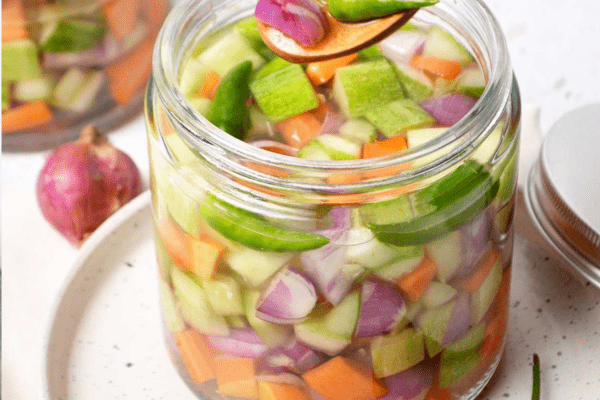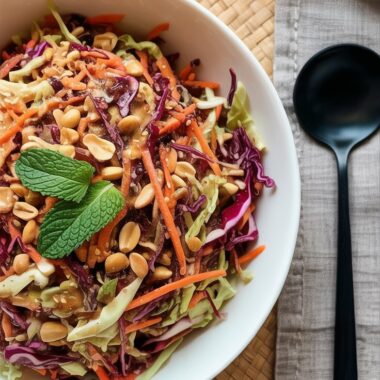Sweet, salty, rich, and full of umami goodness — ramen eggs are that little upgrade that turns an ordinary bowl of noodles into something memorable. These soft-boiled beauties are a must if you’re even mildly into ramen, but they’re just as satisfying on their own, sliced on toast, or snuck straight from the fridge. I keep a few marinated eggs in the fridge almost every week, and trust me, they disappear fast.
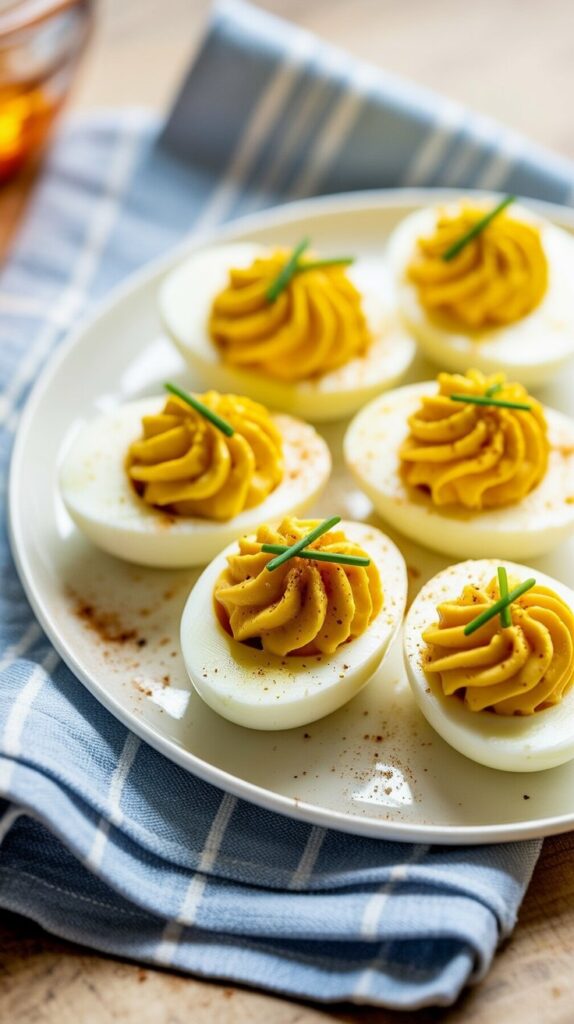
What Makes These Eggs So Good
I used to think ramen eggs were reserved for restaurant bowls only, until I gave them a try at home. The first time I made them, I ended up eating two halves before the ramen even hit the bowl. The secret? A simple marinade that does all the heavy lifting — just soy sauce, mirin, and a splash of dark soy for that deep, savory richness.
You only need to marinate the eggs for two hours to get great flavor, but if you leave them overnight? That yolk turns into something special — almost like it’s been cured. It’s firm but still creamy, like the perfect jammy center that’s just right on a spoon.
And the best part? These eggs are as easy to make as boiling water — literally.
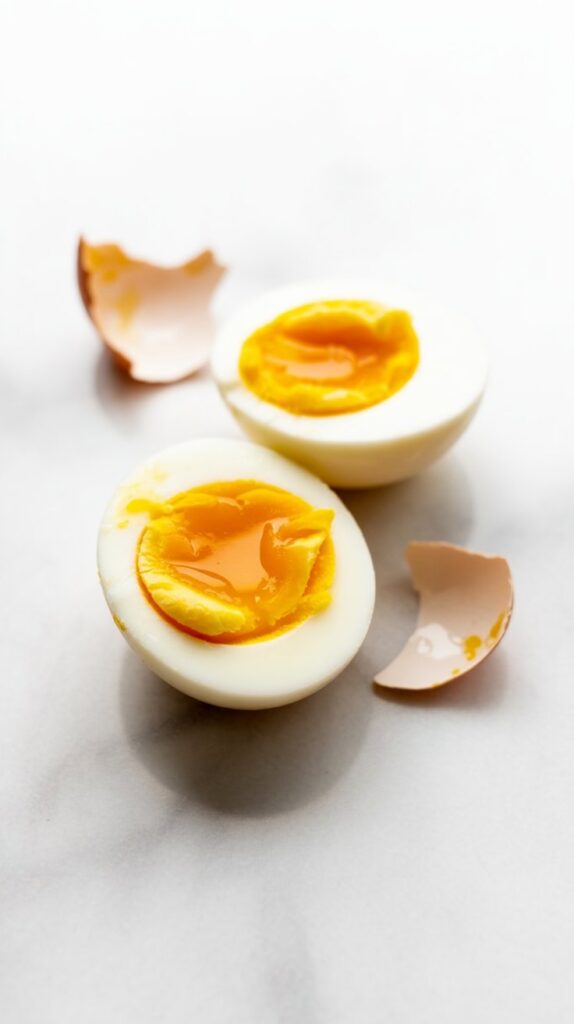
Ingredients You’ll Need
Here’s what goes into the magic:
- Large eggs – Stick with similar-sized eggs so they all cook evenly. I use eggs that are about 57g (the standard large in India and most places). If yours are on the smaller or bigger side, adjust the timing by 30 seconds either way.
- Mirin – This sweet rice wine balances out the salty soy. I usually grab a bottle of Aji Mirin from my local Asian store — it’s alcohol-free and works just fine. If I run out, I mix a little white wine with sugar.
- Light soy sauce – Regular soy sauce (not low sodium) brings in the salt and umami. I usually go with Chinese or Japanese-style, whatever I’ve got open.
- Dark soy sauce – This is my not-so-secret flavor bomb. It adds depth and color. The mushroom-infused version is even better if you can find it. It makes those eggs turn that gorgeous dark brown in just a couple of hours.
- Optional extras – Sometimes I toss in smashed garlic, star anise, or even a sliver of ginger if I want something extra. But for a lazy batch? Just soy, mirin, and eggs do the trick.
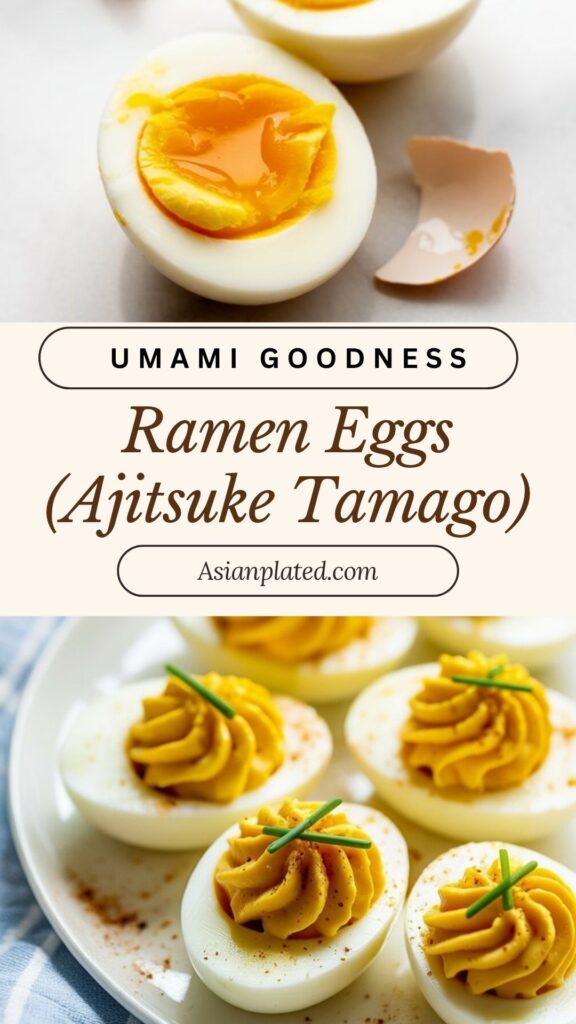
How I Make These Ramen Eggs at Home
Start with the boil
I bring a pot of water to a rolling boil — enough to let the eggs move around freely. I always add a splash of vinegar or a pinch of salt. If one of the eggs is cracked, this helps keep the white from leaking everywhere.
Once it’s boiling, I reduce the heat for a second and gently lower the eggs in with a spoon. No dropping from a height — we’re not launching missiles here.
Then it’s:
- 6 minutes for slightly runny yolks
- 6½ minutes for that perfect jammy yolk — soft, set edges and a creamy center (this is my go-to)
As soon as the timer beeps, I yank them out and plunge them into an ice bath. You can run them under cold tap water too, but ice works faster. This step is crucial — it stops the yolks from turning chalky.
Peel with patience
Once they’re cool, I crack them gently all around and peel from the wider end, under a stream of water. It’s fiddly, but worth it. A smooth egg means a beautiful marinated finish. If the shell clings too much, the egg’s too fresh — older eggs peel easier.
Mix the marinade
I keep the base simple: light soy, dark soy, and mirin. No heating, no fuss. If I’m adding garlic or spices, I’ll warm it on the stove and let it cool before dropping the eggs in.
The ratio I go with is:
- ¼ cup light soy
- ¼ cup mirin
- 1 tablespoon dark soy
Mix, dunk the eggs, and make sure they’re mostly submerged. I usually flip them halfway through if they’re not fully covered.
Let them sit in the fridge for at least 2 hours. Overnight is ideal. If you’re going beyond 8 hours, add a few tablespoons of water to dilute the marinade slightly — otherwise, they’ll go too salty.
Tips from My Kitchen
- Room temp eggs cook more consistently. I take them out of the fridge an hour before boiling.
- Use a timer. These eggs need precision — even 30 seconds over can tip the yolks from jammy to hard.
- Ice bath is non-negotiable. It’s the only way to stop cooking instantly and keep that center gooey.
- Peel gently. I ruined so many in the beginning by rushing. Soft-boiled eggs are delicate.
- Dark soy gives richer color fast. If you’re short on time, it’s a lifesaver.
Ways I Love Serving These
- Of course, in ramen. Nothing beats a bowl of chicken shoyu ramen with a halved ramen egg floating on top.
- Sliced on sourdough toast with a little butter and flaky salt — makes breakfast feel fancy.
- As a snack — my wife loves grabbing one straight from the container when she’s hungry between calls.
- I’ve even mashed the yolks with a bit of miso and mayo for devilled eggs with a twist. So good for potlucks.
How to Store Ramen Eggs
Keep them in an airtight container in the fridge, and they’ll stay good for about 5 days. If the marinade isn’t diluted, I take the eggs out after 4–6 hours and store them separately — otherwise, they get too salty.
But honestly, they rarely last that long in my house. We snack on them constantly.
Frequently Asked Questions
Can I reuse the marinade?
I usually don’t. It’s been sitting with eggs, so I toss it after one batch. But if you boiled it first and kept it clean, you can reuse it once or twice.
Can I use this method for hard-boiled eggs?
Absolutely! Just boil the eggs for 9–10 minutes instead. You’ll get firmer whites and yolks, but the marinade still adds amazing flavor.
Can I freeze ramen eggs?
Nope — the texture gets weird. Best to keep them fresh in the fridge.
What if I don’t have mirin?
No worries. Use white wine or rice wine with a touch of sugar. The flavor won’t be exactly the same, but close enough for home use.
Ramen Eggs (Ajitsuke Tamago)
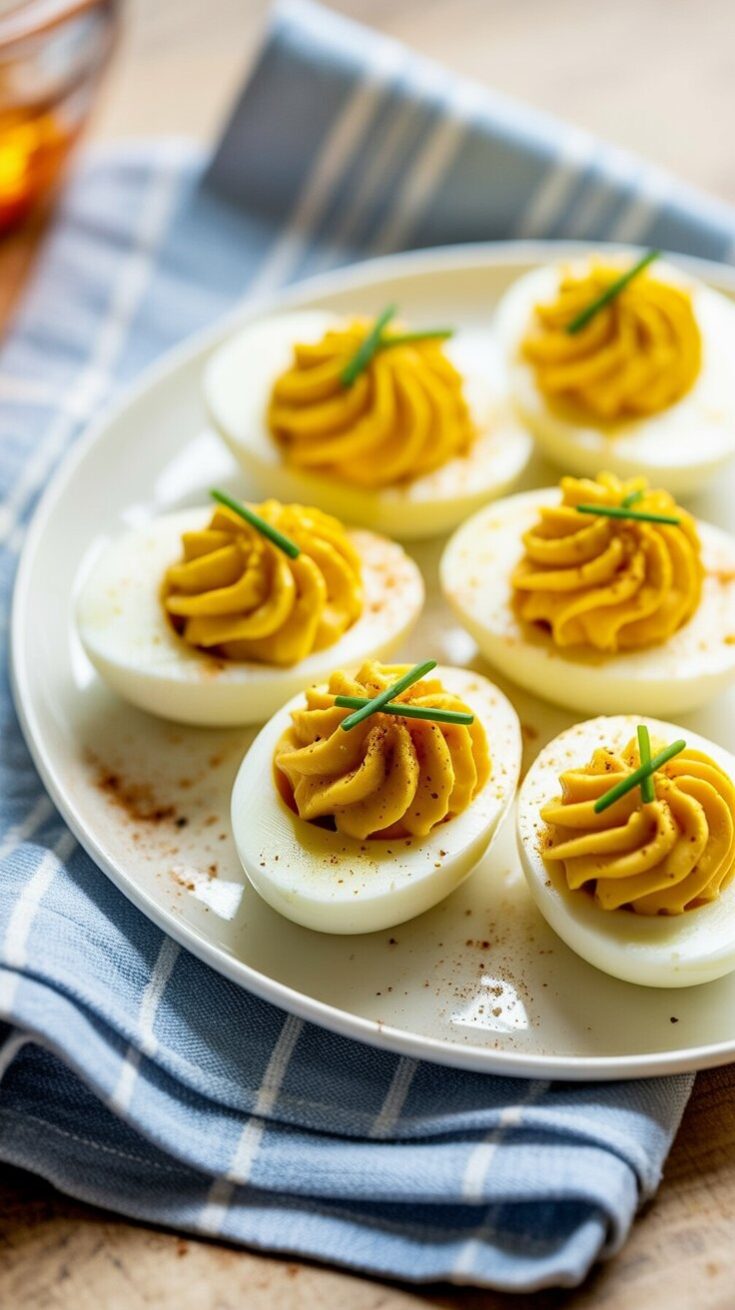
Here’s a fresh take on the beloved ramen eggs recipe, perfectly balanced with sweet, salty, and umami-rich flavors.
Ingredients
- 4 to 5 large eggs (aim for about 2 oz / 57 g each)
- 3/4 cup mirin (or Aji mirin if available)
- 1/4 cup dark soy sauce (or regular soy sauce plus 1 tablespoon brown sugar)
- 1/4 cup regular soy sauce
- Up to 1/2 cup water (optional; use if marinating more than 6 hours)
Optional aromatics and spices:
- 1 star anise
- 1-inch piece ginger, sliced or 2 garlic cloves
- 1/2 teaspoon cayenne pepper
Instructions
- Cook the Eggs: Fill a large pot with enough water to cover eggs by about an inch in a single layer. Add a pinch of salt or a splash of vinegar to help prevent cracking and leakage. Bring the water to a boil over high heat with the lid on. Reduce heat to maintain a gentle simmer (small bubbles, not a rolling boil) to avoid eggs cracking.
- Gently lower the eggs into the water one by one. Start timing once all eggs are in.
- Meanwhile, prepare an ice bath or cold water bowl to shock the eggs after cooking.
- When the timer goes off, quickly transfer the eggs to the ice bath or run under cold water for 2-3 minutes to halt cooking.
- Once cool, lightly tap the eggs all around to crack the shell and peel gently. The 5½-minute eggs may be trickier to peel, so take care.
- Prepare the Marinade: In a tall container, whisk together mirin, both soy sauces, and if using, brown sugar to dissolve it. Optionally, bring the marinade with water, cayenne, ginger or garlic, and star anise to a gentle simmer in a small pan, then cool completely before using. Adding water helps mellow the marinade and prolongs marinating time.
- Place peeled eggs in the marinade, ensuring they sit in a single layer. Refrigerate for at least 2 hours, ideally 8 to 12 hours for deep flavor. You can marinate up to 24 hours if desired.
- When ready, remove eggs from marinade and store in an airtight container for up to 5 days in the fridge. The leftover marinade can be kept for up to 3 weeks and reused.
Nutrition Information:
Yield: 4 Serving Size: 1Amount Per Serving: Calories: 220Total Fat: 6gSaturated Fat: 2gTrans Fat: 0gUnsaturated Fat: 4gCholesterol: 233mgSodium: 1842mgCarbohydrates: 24gFiber: 0gSugar: 20gProtein: 11g
Asianplated.com, occasionally offers nutritional information for recipes contained on this site. This information is provided as a courtesy and is an estimate only. This information comes from online calculators. Although allchickenrecipes.com attempts to provide accurate nutritional information, these figures are only estimates.
Try other Japanese recipes:

